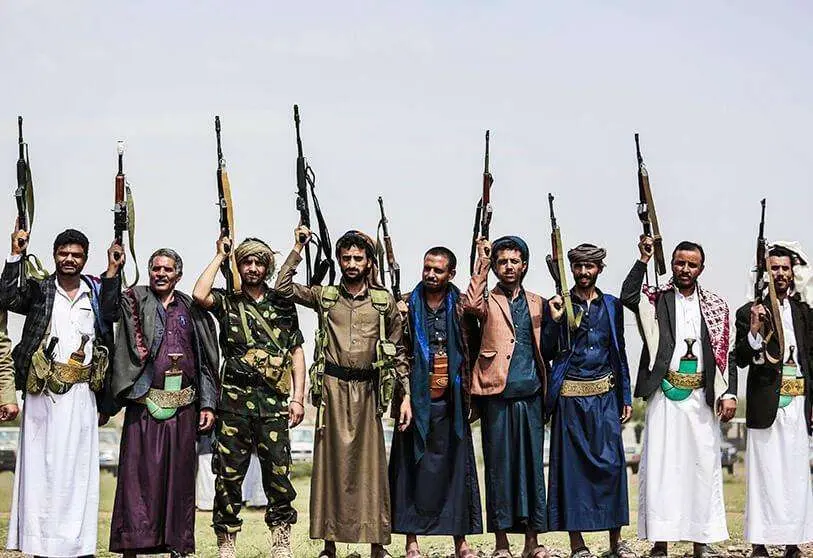Iran continues arms supplies to Yemen's Houthis

What is already the biggest humanitarian crisis since the creation of the United Nations does not seem to have an end in sight. Neither side wants to give in and the stakes in Yemen are getting higher and higher. Since the Houthi coup d'état in 2014, violent actions have been increasing to the point that not even NGOs can reach the civilians who are suffering the consequences of this terrible war.
The war in Yemen broke out at the end of 2014, when the Houthi rebels conquered large parts of the west and north of the country, including its capital, and escalated in 2015 with the intervention of the Saudi-led coalition in support of the internationally recognised government.
A few weeks ago, the new administration of US President Joe Biden withdrew support for this coalition and announced that it would remove the Houthis from the list of terrorist organisations.
Critics of Trump's decision, which was aimed more at punishing Iran, the Houthis' main ally, argued that the designation added to the humanitarian crisis in Yemen. The group's inclusion on this blacklist may further hinder Biden's chances of bringing the relationship with Iran back on track. Many have criticised the decision, as it could worsen the situation in a country that, according to the UN, is experiencing the world's largest humanitarian crisis.

The conflict is considered by the UN to be the largest humanitarian catastrophe on the planet, with more than 24 million people, 80% of the Yemeni population, in need of some form of assistance.
Although there are talks between the parties to the conflict in search of a peace agreement, so far the main outcome of these talks has been the exchange of prisoners of war. The Houthis, the Iranian-backed Shia rebel militia at odds with the Yemeni government and the Saudi-led Arab coalition, have recently stepped up their attacks in several Yemeni regions and Saudi Arabian territories. The aim of this escalation of violence on the part of the Houthi rebels is more than clear: to be able to arrive with a strong position at an imminent dialogue table.
This change in the name of the Houthi militia seems difficult to understand. This is all the more so given that just this week the Houthi militia attacked the civilian airport of Abha in Saudi Arabia. Drone and missile attacks by Yemeni rebels against Saudi Arabia have been commonplace since the Riyadh-led coalition intervened in the Yemeni civil war in 2015 in support of the internationally recognised government of Abd Rabuh Mansour al-Hadi.
In recent days, both the rebels and the Arab coalition have reported a significant increase in attacks against the Kingdom as the UN and the US seek a ceasefire in Yemen after nearly six years of conflict.
This move has provoked fierce debate within the US administration itself, as they are unsure how to create exceptions for humanitarian aid shipments, given that the Houthis are the de facto authority in northern Yemen, as well as controlling the airport in the capital, Sana'a, and the port of Hodeida.
Even so, Iran is fearful of Biden's rapprochement with the militia and is pushing for them to continue attacks on various positions. One of Iran's supports has been to intensify arms transfers to the Houthis, US, Western and Iranian officials tell Reuters, a development that threatens to prolong and escalate the war.
What is clear is that such a complex political, military, economic and other complexities are not being worked out in their entirety by the Houthi militias - far from it. Iran's role is central to the whole conflict.

The increased pace of transfers in recent months, which officials say include missiles and small arms, could exacerbate a security headache for the United States, which attacked Houthi targets with cruise missiles a few weeks ago in retaliation for failed missile strikes against a US Navy destroyer.
Much of the recent smuggling activity has been through Yemen's neighbour Oman, including via land routes that take advantage of the porous borders between the two countries, officials said. This poses a new dilemma for Washington, which views the small Gulf state as a strategic partner and ally in the troubled region.
The escalation of these attacks and shipments comes during a visit by the United Nations (UN) envoy for Yemen to Iran to discuss the conflict in the country with Iranian Foreign Minister Javad Zarif and other senior officials. The two discussed the urgent need for a nationwide ceasefire, the opening of Sana'a airport and the easing of restrictions on ports in Hodeida, Stephane Dujarric, spokesman for the UN chief, said in New York.
In addition to strengthening their negotiating position, observers believe there may be another motive behind the escalation of Houthi violence. It may be a way of blackmailing the international community and the new US administration to return to negotiations on the Iranian nuclear dossier without preconditions.








